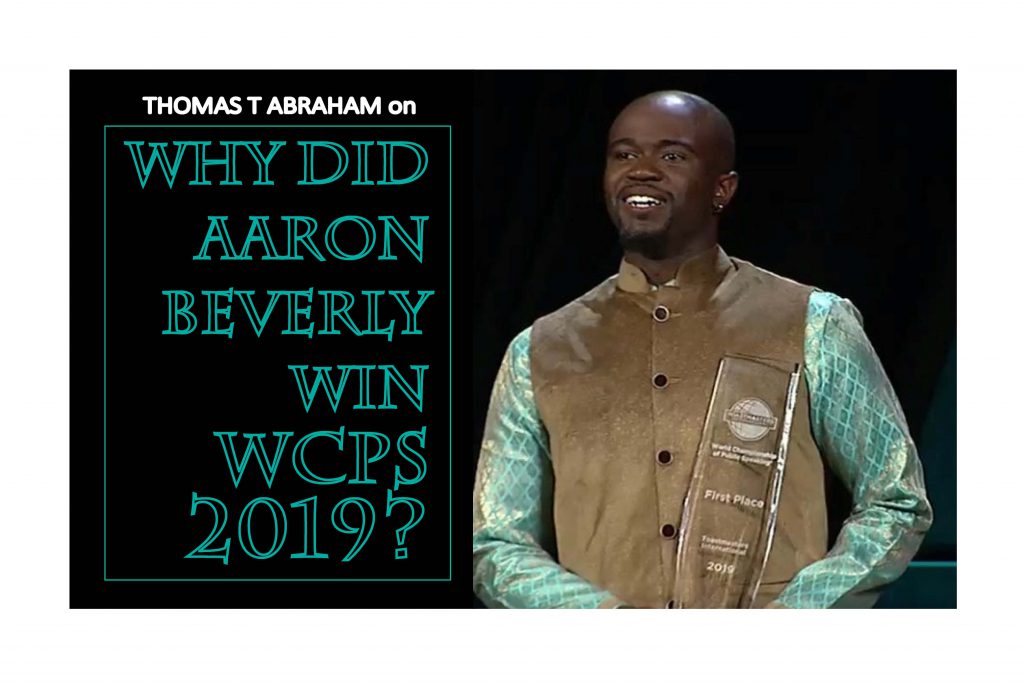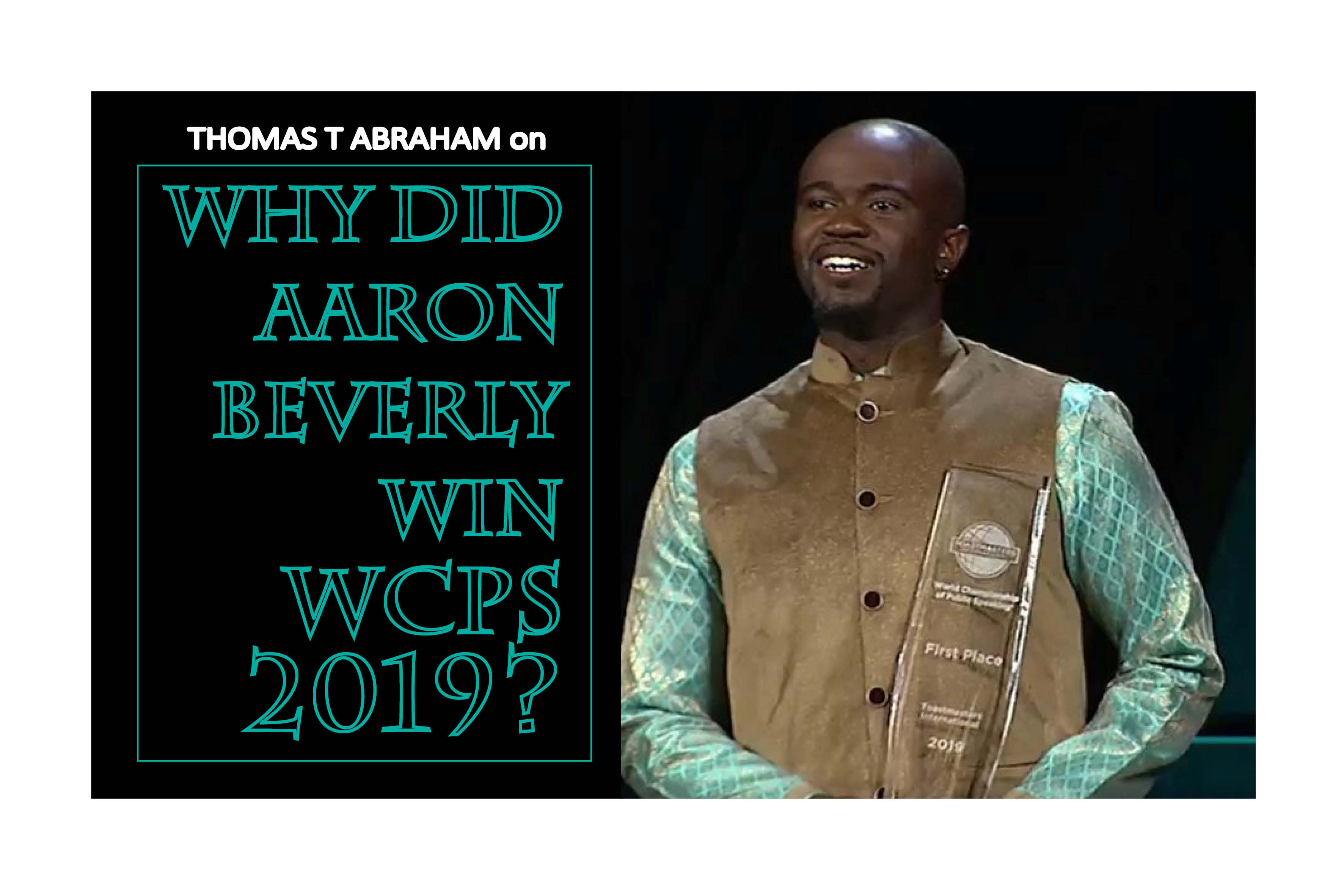Short answer: Aaron is clever.
First thing, he deftly walks around the Toastmasters tenet of presenting all contestants as equals, masking past records and present standing. Aaron pierces through that TM ring of neutrality with his opening line: “The Contest Chair was relieved, my title’s only 3 words long”.
Clever! He is reminding the audience – and of course, the judges – about his 2016 speech with 57 words in its title, which had won him the second prize. Pedigree is established that other contestants cannot match.
Second, the attire. On a day everyone comes on stage dressed formally, how can he stand out, without looking dressed for a fancy dress – and, oh please, without wearing outside, what is meant to be worn inside? The shiny green Indian attire fits him and the theme of the Indian wedding. Then he stands, hands up on either side, like Christ the Redeemer, and asks, “What do you think?” He seeks approval and the audience falls for that flattery and gives its approval with a full-throated yes. He starts to own the audience.
Third, a borrowed Zip file. He uses four words to bring alive the setting for the story: a “sacred Indian wedding ritual”. Those mere four words are a weighty zip file that contains video and audio clips, impressions and images, flavours and smells of what is popularly called the Fat Indian Wedding. A sacred Indian wedding ritual may not be as mysterious and exotic as beating of drums around a large pot on fire in some deep African jungle, still… “Ritual” does the trick. “Sacred” doubles the effect. It is actually a game, as he explains later. But ‘sacred’ and ‘ritual’ it has to be at the opening, to generate curiosity. The impact of some simple words!
Then follows a full story nearly six minutes long. There is a faint hint of the theme when he says that at a wedding between a white family and a brown family, he is the only black. But the story is so absurd and hilarious, yet so absorbing with conflicts escalating, that you forget the colour of skins in the game and just hope that Aaron doesn’t lose the bridegroom’s shoes. The resolution comes unexpectedly, and the message is delivered in breakneck speed, in under 45 seconds, in stark contrast to the leisurely, unhurried progression of the story. Explaining the game as a way for the two families to get familiar with each other, he says: “among White and Indian families, a different, lonely Black man, was accepted like family, too”. Using that pivot, in 6 swift sentences, he introduces the divisiveness that has crept in “nowadays”. Acceptance despite differences is becoming an unbelievable story, he says. He wants that reversed: “Show the world that acceptance despite difference is not an unbelievable story”. That’s the mission he wants the audience to take seriously – ironically, the first time “take seriously” is really serious, and not mock serious as it is till then, in the story.
Four: humour through repetition. “When I have a mission, I take it very seriously”, repeated thrice becomes humorous, especially when you remember that the grand mission is to hold on to a pair of footwear! “They pull, I pull, but I hold firm”, is an exaggeration. That effect turns more humorous at each repetition. The third recall phrase is: ”… don’t give the shoes to anybody!”, repeated with emphatic action of the right hand banging the left palm, to announce round after round of the conflict in the story. Finally, when this quote from Sumit is thrown at back him, the audience roars the loudest.
Five, treading a sensitive theme. Taken together with the other two podium finishers, it would seem that WCPS is going beyond the inspirational stories – of loss of job and girl-friend and down in the dump, until… All three dealt with differences and building bridges over them. Also, not to miss, the cast: a black American with whites and Indians, a Mexican with a Europian, and finally, a Chinese in China, as unChinese as one can be. A good reflection of the human race in transit and migration. In Aaron’s story, there is no victim of race, only recipient of goodness despite race. When talking about race, fewer well-thought-out words, the better. Just seven sentence, like minimum steps when negotiating murky ground.
Conflict resolution happens not in the classical way. Here Aaron loses the shoes and all conflict ends. That’s the only way the story can end. That is the script of the game – to give the bridegroom a taste of what marriage is all about, by forcing him to cough up good cash to the bridesmaids! To the extend the game follows a script, it is a ritual. But sacred? Aha. Sacred, lets agree, adds to the mystery. Clever!
I wish between the two different gears, of the story and the message, there could be more pause to allow for a little contemplation and to realise that the story has ended. I also wished Aaron had something better than Ominous smiler as a name. “Call her Ka the Snake” (India connection via Jungle Book), I would have advised him.
What hasn’t changed, though, is that the hero is no He man. He is naive enough to take a silly game too seriously (Clearly, Sumit forgot to tell him it was a game and he must give up the shoes some time. Unless, for humour, Aaron extended the game in his script till the burly photographer made it nine Vs one). He is also lucky enough to receive goodness from people on the other side of the racial divide. That confirms the other unchallenged ‘qualification’ for WCPS winners: optimism. Optimism, even despite “so much divisiveness”.
Tragic heroes of Greek tragedies were created to neutralise excess pity
and fear. On Toastmasters stage, speeches work when the audience feels for the
protagonist, empathises, wishes him well… and walks out feeling good, not
stealthily wiping embarrassing tears. Remember, we are Toastmasters!

